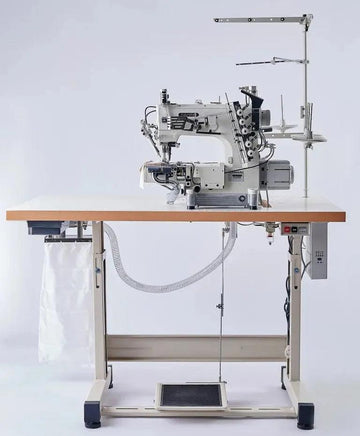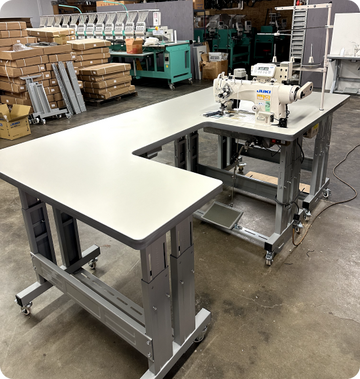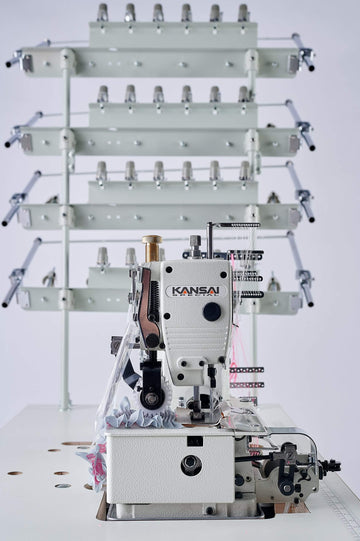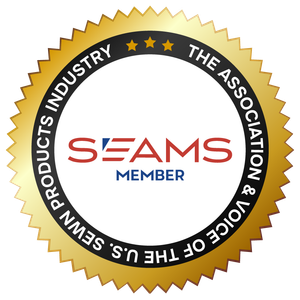Finding the right sewing machine can be overwhelming, regardless of your experience with the needle. Are you planning to do simple sewing tasks at home? Or are you up for large projects in manufacturing settings? The main decision is whether you're buying domestic or industrial. Your choice will determine your future performance. So what are the main differences? Find out more details about industrial vs domestic sewing machines below.
Key Differences Between Industrial and Domestic Sewing Machines
Industrial machines are made for manufacturing needs. Domestic machines are meant for personal and home use. Should you choose an industrial or domestic sewing machine? The main differences include:
-
Build quality and durability. Industrial machines are built to sew through thick materials. Their durability is high enough to guarantee continuous performance at high speed. Domestic machines are less durable when it comes to extensive sewing tasks.
-
Speed and motor power. Industrial machines have higher speed because of their incredibly powerful motors. Domestic machines have lower speeds, which affects their productivity.
-
Stitching capabilities and precision. Industrial machines usually specialize in specific types of stitches to deliver greater accuracy. Domestic machines focus on multiple stitches to complete basic sewing tasks.
-
Size, weight, and portability. Industrial machines are usually large and heavy, requiring a stable surface. Domestic machines are considerably smaller, delivering high portability.
-
Suitable fabric types and materials. Industrial machines handle thick materials, such as multiple layers of fabric, leather, and canvas. Domestic machines handle lighter fabrics like cotton and silk.
Industrial Sewing Machine Needles vs Home Machine Needles
Industrial sewing machine needles differ from home machine needles in size, strength, and design. Industrial needles produce quick stitches and handle heavyweight materials like leather, canvas, and denim. They are usually thicker, longer, and have sharper points for specific commercial applications. They also come in standardized systems (e.g., DBx1, DPx5), which aren’t compatible with home machines.
Home sewing machine needles are designed for lighter fabrics and average use. They are more flexible, easier to replace, and labeled with universal systems (like 130/705 H). These needles handle different materials but wear out faster under frequent use.
Comparing Industrial Sewing Machines vs Home Sewing Machines
Industrial sewing machine vs home sewing machine usage scenarios reflect the main differences between them. Industrial machines are designed for a heavy-duty workload, being able to run for longer hours without overheating and deal with more complex projects. If you are up for a serious sewing project that requires a lot of sewing tasks, you’d better go with an industrial model.
|
Pros |
Cons |
|
High-speed stitching and greater efficiency |
Expensive initial cost |
|
Handles heavy fabrics and thick layers |
Need for constant cleaning |
|
Built for long hours of continuous use |
|
|
High durability for smooth performance |
Domestic machines can be used for a couple of hours at a time, which makes them perfect for personal and home tasks. They handle light fabrics and produce fancy stitches, but you may need to constantly adjust the material. Unlike industrial machines, they don’t require constant cleaning due to less complex build.
|
Pros |
Cons |
|
Affordable and widely available |
Slower speed and lower power |
|
Lightweight, enabling high portability |
Not suitable for heavy fabrics |
|
Supports multiple types of stitches |
Less durable for frequent use |
|
Low maintenance needs |
|
Choose the right machine based on your project needs and budget. The fabrics you are going to work with shouldn’t be ignored as well.
Portable vs Industrial Sewing Machines: What to Choose Based on Needs?
When choosing a portable vs industrial sewing machine, you should understand your needs. What is your project volume? How much space do you need? Are you planning to move it from one place to another? Domestic machines are usually constructed with lighter materials, which makes them more portable but less durable for heavy-duty tasks. Compared to large and heavy industrial machines, domestic machines can be located in smaller workspaces.
Read Also: How to Choose an Industrial Sewing Machine?
Understanding Commercial or Industrial Sewing Machines: What Sets Them Apart?
Commercial and industrial sewing machines are built with certain specifications, which make them serve different purposes. Industrial machines are designed for more complex, repetitive tasks in factory settings. They are built to run at high speeds, usually performing one specific function, like straight stitching or overlocking.
Commercial sewing machines strike a balance between industrial durability and basic features. They are suited for small businesses, alteration shops, or boutique studios that require consistent output without the need for massive industrial capacity.
Industrial Sewing Machine vs Best Home Machine: Price and Performance Comparison
When comparing an industrial sewing machine to the best home sewing machine, the differences become clear. Industrial machines usually cost from $800 to $5,000, depending on the brand, model, and functionality. They handle thick materials and long work hours, but often perform a single task.
Home sewing machines may cost from $300 to $1,200. They offer extensive features to handle multiple tasks at home. But you shouldn’t expect high durability from these machines.
Industrial models have high durability and efficiency, while requiring more space and money. Home machines focus on the convenience of use, which makes them perfect for casual sewers.
Industrial Sewing Machine vs Normal Sewing Machine: Which One to Choose Based on User Needs?
Choosing between an industrial and a home sewing machine depends on your sewing goals. If you run a business, work with heavy fabrics, or do sewing tasks that take long hours, an industrial machine can be the right option. It's perfect for high-volume work but comes at a higher cost and with a shorter warranty.
If you need a sewing machine for domestic use, a home machine is the right fit. It usually performs multiple types of stitches and usually comes with a longer warranty. Consider your project type to select the right sewing machine.
Conclusion: Useful Recommendations
Industrial sewing machine vs domestic sewing machine can be a serious dilemma for potential buyers. Once you make your needs clear, making the choice becomes much easier. In South El Monte, Los Angeles, California, you can find a great number of professional brands producing various models within different price ranges. Don’t rush with the final choice! Make sure to check the available features, components, and customer reviews. Refer to local retailers to buy an industrial or domestic sewing machine that meets your particular needs.
Co-Owner at Prizzi Sewing Machine Co.
Expert in sewing factory workflow optimization











